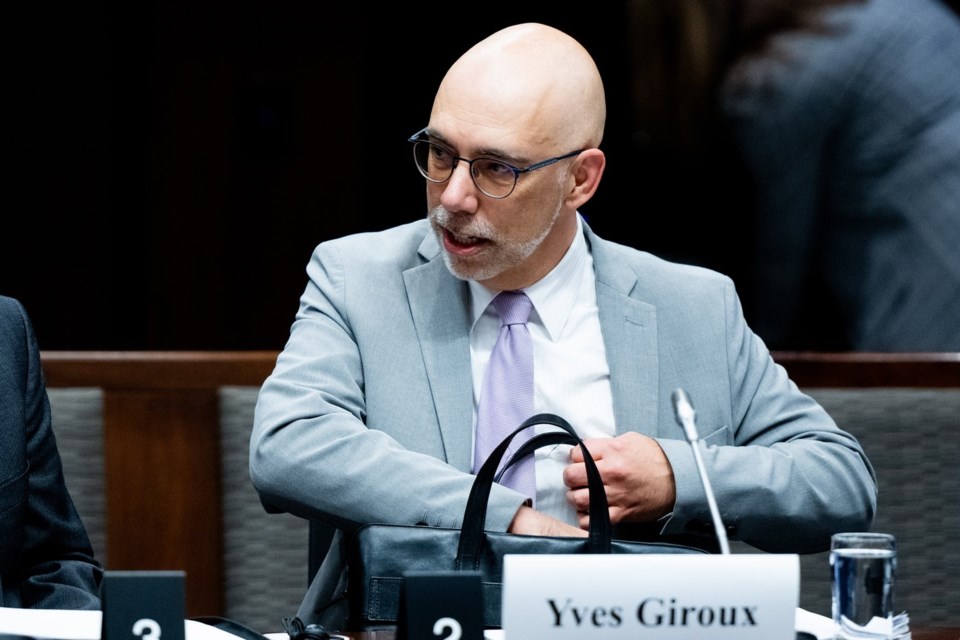OTTAWA — Conservative Leader Pierre Poilievre vowed Thursday to repeal the Liberals' Online Harms Act should it become law, the same day the parliamentary budget officer estimated that setting up proposed new regulators would cost $200 million over five years.
The analysis from the budget watchdog looks at the federal government's pledge to establish a Digital Safety Commission to regulate social media companies and force them to limit harmful content online.
If the legislation passes in Parliament, that commission would establish a set of regulations and have the power to levy fines against companies that break the rules.
The online harms bill also proposes creating a Digital Safety Ombudsperson that Canadians can bring their concerns to, as well as a new Digital Safety Office.
The budget watchdog says the Heritage Department estimates those new entities will employ about 300 people when they're fully up and running.
"The (parliamentary budget officer) estimates that from 2024-2025 to 2028-2029 the total operating costs will be $201 million, minus any possible administrative monetary penalties, fines … or regulatory charges collected by the commission, ombudsperson and office," it reads.
The report notes the government may collect revenue by fining companies that don't comply, but the estimated costing does not include an analysis of what that could look like.
"There is a high degree of uncertainty in the revenues that will be generated since it depends on the willingness of outside enterprises to follow the requirements set out by the commission and the Online Harms Act."
Costs may also be higher if the new entities decide to use outside consulting services or legal support, the report says.
The watchdog notes that the government's staffing estimates are based on other Canadian and international regulators.
Justice Minister Arif Virani introduced the online harms bill in February, saying social media giants must take accountability for harmful content.
But the Opposition Conservatives have been critical, saying it will accomplish nothing more than create a new bureaucracy.
And on Thursday, Poilievre went further, pledging to do away with it altogether.
If the law passes, "a Pierre Poilievre common sense Conservative government will repeal it," spokesman Sebastian Skamski said in a statement.
The party also sent out an email blast to supporters asking them to help Poilievre defeat what it called the "three-headed monster" — or a trio of Liberal bills that seek to regulate tech giants.
"Common sense Conservatives oppose (Prime Minister) Justin Trudeau’s three headed censorship monster and new $200 million bureaucracy," Skamski said.
NDP House leader Peter Julian said in a statement on Thursday that children are being subjected to online harms such as extortion and bullying.
"Children are taking their own lives because they were sexually extorted online or faced with other forms of online harm. And Pierre Poilievre doesn't want to stop this."
Conservative MP Michelle Rempel Garner had requested the PBO analysis on the costs that would be involved in setting up the new system.
She has argued the government could instead modify existing laws and regulators to ensure Canadians are better protected online.
"The Liberals' controversial legislation has received significant criticism from concerned Canadians and raised alarm amongst legal experts and civil rights advocates," she said in her own statement.
"Now we learn Trudeau will spend over $200 million of taxpayers' money on his useless 330 person censorship bureaucracy instead of using that money to hire police, protect Canadians and lock up criminals."
In addition to the proposed online harms bill, the Liberal government has laws on the books that regulate online streaming services and social media platforms that display Canadian news content.
Poilievre often accuses Trudeau of censorship in reference to those bills, while the Liberals say the Tories are guilty of peddling misinformation about what the legislation actually does.
Virani's office said in a statement that Poilievre was "placing ideology ahead of investing in the safety of our children.”
A spokeswoman also defended a budget promise of $52 million over five years to create the new commission and ombudsperson.
"As other countries have found, the volume of harmful content online is staggering. Canadians deserve to have a digital safety commission with the resources to do its job effectively," said Chantalle Aubertin.
"However, taxpayers should not have to foot the full bill for the inaction of social media companies. That's why social media companies will be required to help cover the costs of the new commission and ombudsman."
Virani previously suggested to reporters that the new suite of regulators would not be established before the next federal election, which must happen no later than October 2025.
The file landed on his desk years after Trudeau first promised to legislate against online harms during the 2019 election campaign. It was previously assigned to the minister of Canadian heritage.
Experts widely panned a consultation paper released around the time of the 2021 federal vote, which proposed a 24-hour takedown rule for content flagged as harmful — an approach they said risked censoring legal content and chilling free speech.
That feedback prompted the government to return to the drawing board and assemble a new expert advisory group.
The current bill has prompted criticism by civil society advocates and legal experts over its criminal justice reforms, which include proposing stiffer sentences for hate-related crimes and reinstating a controversial section of the Canadian Human Rights Act that would allow Canadians to lodge complaints about hate speech.
This report by The Canadian Press was first published July 4, 2024.
Stephanie Taylor, The Canadian Press



